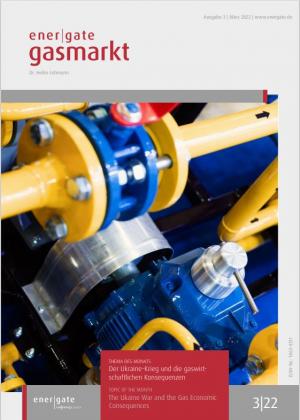As I write this text, war has been raging in Ukraine for five days. And it is a war that you, dear readers, would not and could not have imagined in Europe after the lessons of the Second World War. Russia has attacked Ukraine, the justifications seem absurd. It is more reminiscent of the 19th than the 21st century. But even if one has to overcome a certain paralysis in order to continue working - as a manager from the gas industry with whom I spoke said, too - one has no choice but to deal with the consequences as soberly as possible. Since I am not a political analyst, I can only deal with the consequences for the gas industry. And gas is economically at the centre of this crisis. For the companies of the German gas industry, the war in and around Ukraine will bring to an end convictions that were formative for the entire industry for the entire natural gas era (pre- and post-liberalisation): Gas-related economic relations with Russia can be kept out of political tensions; economic gas-related ties have a peace-building and stabilising effect & the gas industry is in a position to regulate issues relating to the security of gas supply without political intervention...
Stay up to date with the free Gasmarkt-Newsletter! We will inform you about new issues by e-mail and give you an insight into the contents.
- All Issues
- energate Gasmarkt
- Issue 03|22
- Issue title:
The Ukraine War and the Gas Economic Consequences
- Publication date:
- 07.03.2022
- In this issue:
In February, things once again turned out differently than planned. Before leaving for my skiing holiday, I conducted a lengthy interview with Toni Reinholz from the German Energy Agency (Dena). The topic was guarantees of origin and certification of hydrogen, a very complex matter, but important for the market ramp-up of hydrogen. The interview was to be the topic of the month. Then the Ukraine crisis came to a head and Chancellor Olaf Scholz announced that the certification procedure for Nord Stream 2 would be suspended (at least that's the short version). I had planned to cover the topic in the editorial; there's not really much to report on it anyway. Then the Russian invasion of Ukraine began, which I did not believe in until the very end.
The gas economy has been different since the increasingly severe gas price turbulence and the change of government, but at the latest since the start of the Ukraine war. This urged me to write about it, so at the last moment, a piece strongly influenced by my opinion became the topic of the month. Comments are, of course, welcome.
How fundamentally the gas market will change remains to be seen. But my guess is that it will. What is clear is that at least the Federal Ministry of Economics and Climate Protection (BWMK) of the current federal government has no interest in a "natural gas market" in which price signals guide action. The BWMK will do everything it can to phase out the use of natural gas as quickly as possible. An ad-hoc working group on "gas reduction" has been set up in the ministry. The draft position paper of 22 February states: "Natural gas has so far been considered a safe and cost-effective bridge towards a climate-neutral energy supply (...). The current energy price crisis and geopolitical uncertainties require a re-evaluation of natural gas as a bridge to the baseload capability of renewable energies".
Due to my skiing holiday, the manuscript was only completed on 28 February. Let me assure you, dear reader, that I worked on everything related to the current crisis right up to the editorial deadline.
These will be/remain exciting times. Enjoy the reading nevertheless.
Sales Contact

Frequently Asked Questions
1. What is the energate Gasmarkt?
The energate Gasmarkt provides specialists and executives in the gas industry with up-to-date information and background information on the German and international gas market. The medium expertly explains the most important developments in the fields of market, law, politics and business. In addition, the energate Gasmarkt offers insider information such as market rumors and personal details.
2. What is the energate Jahresreport Gas?
The energate Jahresreport Gas traces the most important market developments of the year and provides a well-founded outlook for the coming months. Gas expert and insider Dr. Heiko Lohmann analyzes relevant events in politics, law and regulation as well as on generation, infrastructure and trade. In addition, the report provides information on changes in the corporate landscape and tracks price developments in market reports. Top decision-makers from the industry use the Jahresreport Gas as a compact chronicle of the year and to assess future market developments.
3. How often are these publications released and in which formats are they available?
The energate Gasmarkt is published monthly. Subscribers will receive the energate Gasmarkt as a print and PDF version in German and English. The Jahresreport Gas is published annually (beginning of December).
4. Can I purchase individual issues of the energate Gasmarkt?
Yes, you can purchase individual isses as print or PDF version. Payment options include purchase on account, credit card or PayPal.
5. How much is a subscription of the energate Gasmarkt and how much does the Jahresreport cost?
A subscription to the energate Gasmarkt (single licence) costs 110,- Euro/month (plus VAT). An edition of the Jahresreport Gas costs regularly 390,- euro (plus VAT).
6. Are there any special conditions if several employees in a company would like to receive the Gasmarkt?
With several Gasmarkt recipients in one company, the price of the second and all other licenses is reduced significantly. We are happy to make you a fair offer for team or corporate licenses!
7. What benefits do I get by registering?
A free energate account is required to order the energate Gasmarkt or the energate Jahresreport Gas. Registered users receive an overview of the contents of the current issue of energate Gasmarkt by e-mail on the day of publication.
8. I would like to read energate Gasmarkt or energate Jahresreport Gas digitally. Where can I find my e-paper version?
As a subscriber to energate Gasmarkt or as a purchaser of energate Jahresreport Gas, you will also receive an e-paper version in addition to the print edition. You can find it at online.energate-gasmarkt.de. Please use your energate account to log in.


